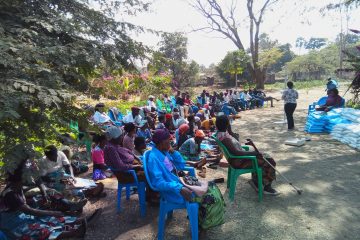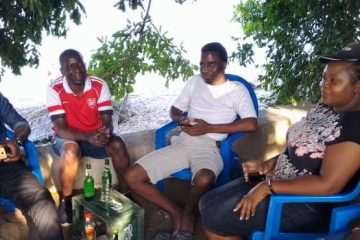| Day Care is one of the palliative care models which has been used at Ndi Moyo since 2010. A group of patients (usually 15) is invited to come to Ndi Moyo and stay from morning to mid-afternoon. Twice a month two different groups of patients are hosted by the Ndi Moyo team, the aim being to entertain the patients thereby providing diversion therapy. Furthermore, guardians are relieved at home and this gives them a chance to do other chores. |
| Day care also provides a useful platform for patients to interact and share experiences. This activity was, due to Covid-19, suspended in April 2020 and only resumed in May of 2022.The choice of patients to participate in day care usually depends on their functional status in addition to the distance of their homes from Ndi Moyo. |
Day Care activities
There are a number of activities carried out during day care. Patients are allowed to participate in activities which they can manage and are comfortable with. Some of the activities are:
- Indoor games – patients play games (such as Bawo, draft, playing cards) with other patients or Ndi Moyo members of staff.
- Music and dancing – music is played patients who can dance take to the floor.
- Handicrafts – some patients will knit, saw or make beads
- Health education– Ndi Moyo clinical staff educate patients on issues related to health promotion such as COVID -19 prevention, medication and compliance.
- Sharing experiences– patients take the opportunity to chat and share experiences.
- The day’s climax is when patients are treated to a tasty lunch. Rice, chicken, goat meat and a soft drink form part of the treat which these patients enjoy with Ndi Moyo staff.
By Dominic Kangachepe, Training Manager
Tony Makungwa
| Tony is an Ndi Moyo patient admitted in 2018 with a diagnosis of HIV/AIDS and Kaposi’s Sarcoma and was registered at Ndi Moyo for palliative chemotherapy. He responded very well to the prescribed treatment for his condition, however in 2021 Tony started feeling leg pains and reported to have urethral discharge which was then treated at the Salima District Hospital. Tony lives with his sister in a village some 24 kilometers on the western side of the Salima district. His sister is the female family head and depends on small scale farming to support her family. Tony and his sister live in a grass thatched hut in very depressing conditions. He survives on food supplements supplied by Ndi Moyo which consist of maize and soya flour. Ndi Moyo has also assisted Tony with a mattress and a blanket as prior to this he slept on a hard floor with only a mat. |
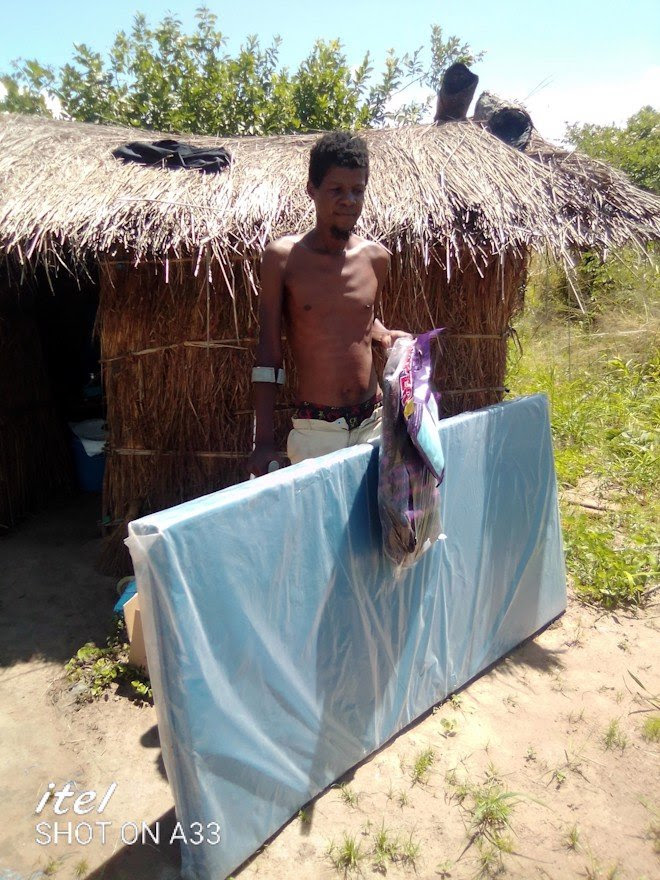
Ndi Moyo has been giving Tony pain relief medications on a monthly basis and carried out home visits to assess his progress. He has severe pain and so receives Liquid Morphine every 4 hours to relieve this pain. He also gets Paracetamol every 8 hours and Bisacodyl every 24 hours to relieve his constipation. Tony is also continuously counseled on the importance of taking antiretroviral drugs.
Spiritually Tony is a Seventh day Adventist, but because he stopped going to church he has no spiritual support from fellow Christians. Ndi Moyo is trying to reconnect him to his church to help relieve his isolation as he and his sister live on a farm on the outskirts of their home village. Tony has been included on the bi-weekly home visit schedule.
Tony is grateful for the support he receives from the Ndi Moyo team. It is very clear that without this support he would feel very depressed and isolated.
By Rex Chinzu
Madalitso Phiri
| Madalitso Phiri is a 45 year old widow, with three children. She was enrolled on the Ndi Moyo Palliative Care programme in early 2007 after noticing swelling of her legs. The Ndi Moyo clinical team referred her to Salima District Hospital where she tested positive for HIV and was confirmed with a diagnosis of Kaposi’s Sarcoma. Madalitso was started on antiretro-viral therapy towards the end of January 2007 and was also started on Vincristine chemotherapy. A few months later she started getting a dual chemotherapy treatment of Bleomycin and Vincristine in order to obtain better treatment results. |
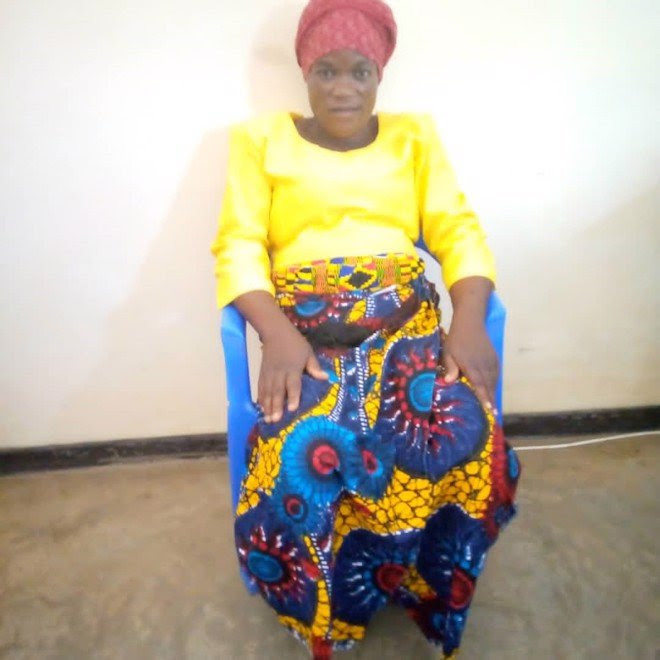
Between 2007 and 2011 Madalitso’s condition improved tremendously as she continued with medication and psychosocial counselling with the Ndi Moyo clinical team.
In 2011 however, Madalitso got pregnant and gave birth to her third child. Her immunity decreased drastically because of the pregnancy and her Kaposi’s Sarcoma lesions restarted. Counselling on progression of the disease was carried out and she responded very well. After weaning the baby she was restarted on chemotherapy, but because she had already received 20 cycles of Bleomycin and Vincristine she had to be referred to the Kamuzu Central Hospital in Lilongwe for a different type of chemotherapy.
Madalitso has continued to receive much needed support from Ndi Moyo’s Palliative Care team each time she comes for clinical reviews. She has also been given maize flour and soya supplements as she has been too weak to fend for her family. Each time she travels to the Country’s main referral hospital in Lilongwe, Ndi Moyo has met her transport needs. In one of the clinical reviews Madalitso confessed, “I wouldn’t have been alive today if it was not for Ndi Moyo Palliative Care.” She is now in a very stable condition and hopes that she can, one day, find some capital to enable her start a small scale business.
By Evelyne – Palliative Care Clinical Officer
Bamusi Malikuta
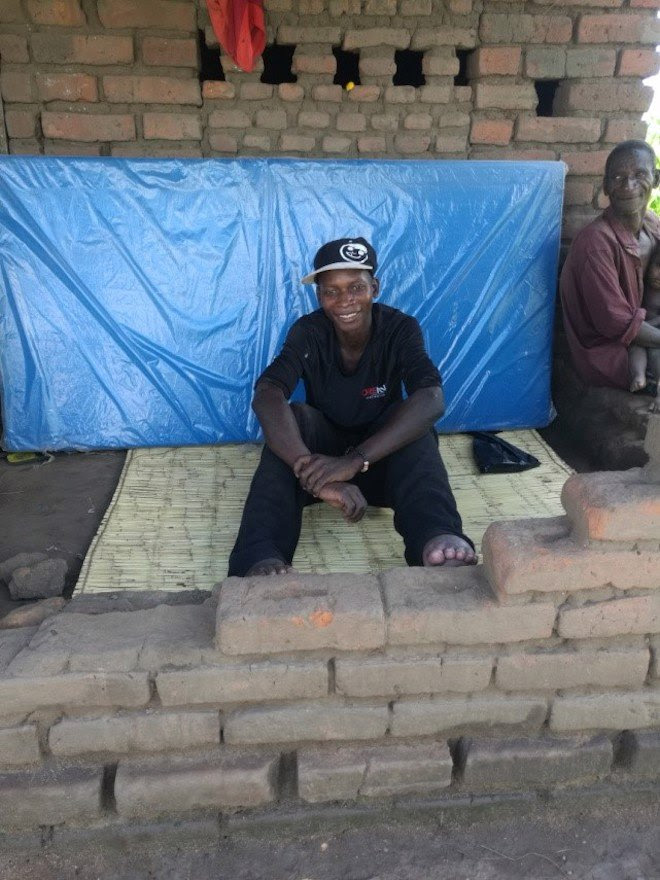
| Bamusi is a 27-year old man diagnosed with Kaposi’s Sarcoma (KS) in 2020. He came to Ndi Moyo in December of 2020 complaining of swelling and severe pain in both legs. Bamusi was subsequently enrolled on Ndi Moyo’s programme for pain and symptom management. Ndi Moyo has provided holistic palliative care to Bamusi to improve the quality of his life. He was given analgesics to relieve his pain and also started on chemotherapy for KS management. He received chemotherapy for about six months at Ndi Moyo but unfortunately there was no improvement and the swelling was not subsiding. The visiting Oncologist from Lilongwe referred him to the main referral hospital and cancer centre in the capital city, Lilongwe, for second line chemotherapy. |
| The cancer centre in Lilongwe is 120 kilometres from Bamusi’s home and Bamusi, with no stable source of income, could not afford transport money to get to the cancer centre fortnightly. Ndi Moyo, through its comfort fund, supported Bamusi with transport money to enable him to travel to Lilongwe to receive second line chemotherapy. After about 2 months there was significant improvement in the swelling of his legs. Bamusi, however, needs more support for his family as he has a wife and four children (with a set of twins) but is unable to support them because of his illness. His family needs food and other necessities including a proper house. Despite the relief received for his transport burden, Bamusi’s family is still in dire need and unfortunately due to funding constraints, Ndi Moyo is unable to meet his family’s needs. By Dominic Kangachepe |
Mary Gibson
Mary is a 60 year old lady, divorced with 7 children. She started experiencing pain in her right breast in early January 2018. When she visited the Salima District Hospital she was given analgesics which only partially relieved her pain. As months passed and her pain was becoming more and more unbearable, she decided to visit Ndi Moyo upon a recommendation by a friend.
Her first visit to Ndi Moyo was on 20th July 2018 when she complained about severe pain in her right breast and shoulder. On assessment, a lump was detected in her right breast. Strong analgesics were prescribed to relieve her physical pain and she was booked into the Oncology Clinic. The visiting Oncologist referred her to the Kamuzu Central Hospital in the capital city Lilongwe (some 120 kms away) where a biopsy was taken. The results confirmed that she had breast cancer and she started chemotherapy right away to reduce the size of the tumor. After 6 cycles of chemotherapy she was referred to the surgeons who assessed her and then booked her in for a mastectomy, which was carried out early December 2018.
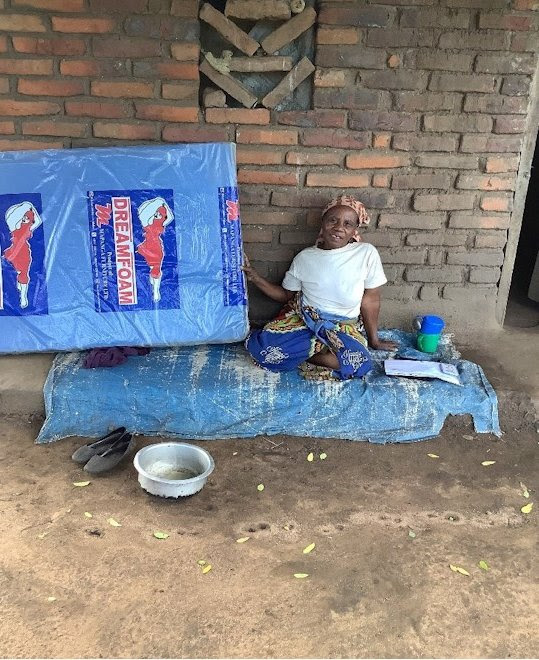
Mary’s incision site healed very well with no complications and she continued to go to Kamuzu Central Hospital for follow up visits after the surgery, courtesy of Ndi Moyo’s comfort fund. In all she made a total of twelve trips to the Kamuzu Central Hospital in Lilongwe. In order to cut costs and help her with travel fatigue, Mary was advised to get her reviews done at Ndi Moyo’s monthly Oncology Clinic days.
The quality of Mary’s life improved the day she stepped into the Ndi Moyo Palliative Care compound where the Ndi Moyo clinical team relieved her severe physical pain and referred her to the central hospital where the diagnosis was confirmed in time followed by her mastectomy. She also received continuous counselling to help her understand the disease process and to help her cope with the psycho-social pain of losing one of her breasts.
Mary is now very happy as she is able to work in the field as a farmer and carry out all her household chores. She continues to come to Ndi Moyo for monthly Oncology visits and food supplements.
Mary is pictured at her house where she received a mattress to help improve her comfort as she previously slept on a plain mat.
By Anastasia Munthali Gasten
Reginati
Reginati is a 75 year old widow who had 7 children but lost 5 of them, with the remaining two being married. She lives close to the Government District Referral Hospital of Salima within the town.
Reginati was well until March 2021 when she started having vaginal bleeding many years after the menopause. She visited Salima District Hospital where she was given some medication, but this did not stop the bleeding. She was booked for a Visual Inspection with Acetic Acid (VIA) at the District Hospital but unfortunately each time she went there the clinic was closed.
In May 2021 she decided to come to the Ndi Moyo Palliative Care Centre after hearing about Ndi Moyo’s services from her neighbours. Upon visiting Ndi Moyo on a VIA clinic day she was screened for cervical cancer and her results showed she was a cervical cancer suspect. She was immediately given medication (Tranexamic Acid) to control the bleeding and scheduled for the next Oncology Clinic.
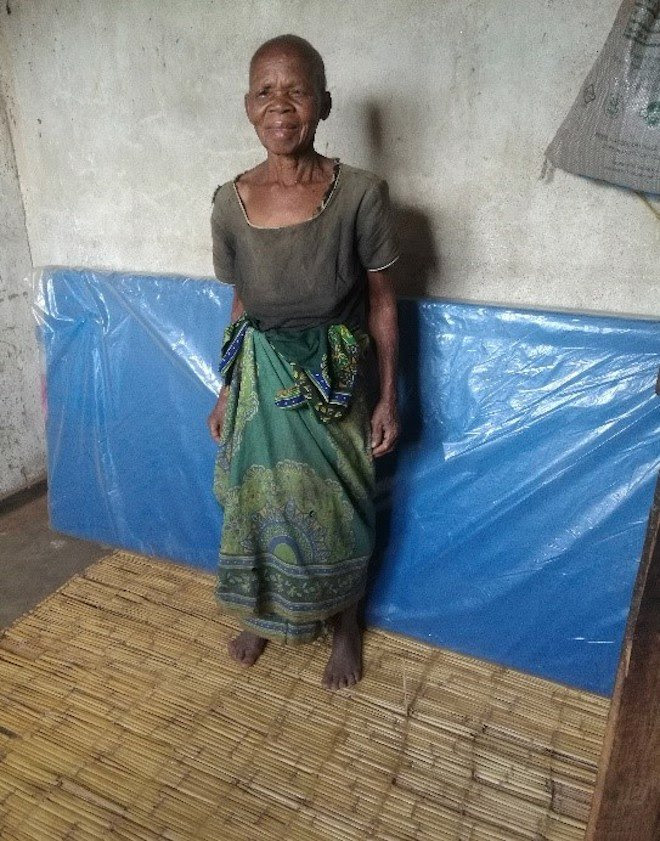
| In early June 2021 the visiting Oncologist referred her to Kamuzu Central Hospital in the capital city, Lilongwe, for biopsy. The results confirmed that she had cervical cancer Stage 3A which meant it was already advanced and therefore she was initiated on Palliative Care chemotherapy to control the bleeding, vaginal discharges and pain. Reginati has serious financial challenges as her two married daughters do not have stable sources of income to support their mother. |
| Reginati has been supported financially to enable her to travel to the main referral hospital in Lilongwe through the comfort fund at Ndi Moyo. She received 6 cycles of chemotherapy and has experienced a great improvement – the bleeding has stopped and she experiences only mild pain. The Ndi Moyo team visited her for a home assessment where they discovered she sleeps on a hard surface. She was subsequently provided with a mattress to enhance her comfort at night. Reginati’s body mass index falls within the category of severely malnourished patients and she now receives nutrition support on a monthly basis in the form of maize and soya meal. With the continuous counselling by the Ndi Moyo team, Reginati is able to understand the disease process and able to cope with her illness. Ndi Moyo has managed to control the physical, social and psychological pains that Reginati was experiencing before she visited the clinic and hugely improved the quality of her life, despite her having an incurable and advanced disease. By Anastasia Gasten |
